

CELEBRATING A WILDCAT HOMECOMING CELEBRATING A WILDCAT HOMECOMING


S gnpost S gnpost THE THE



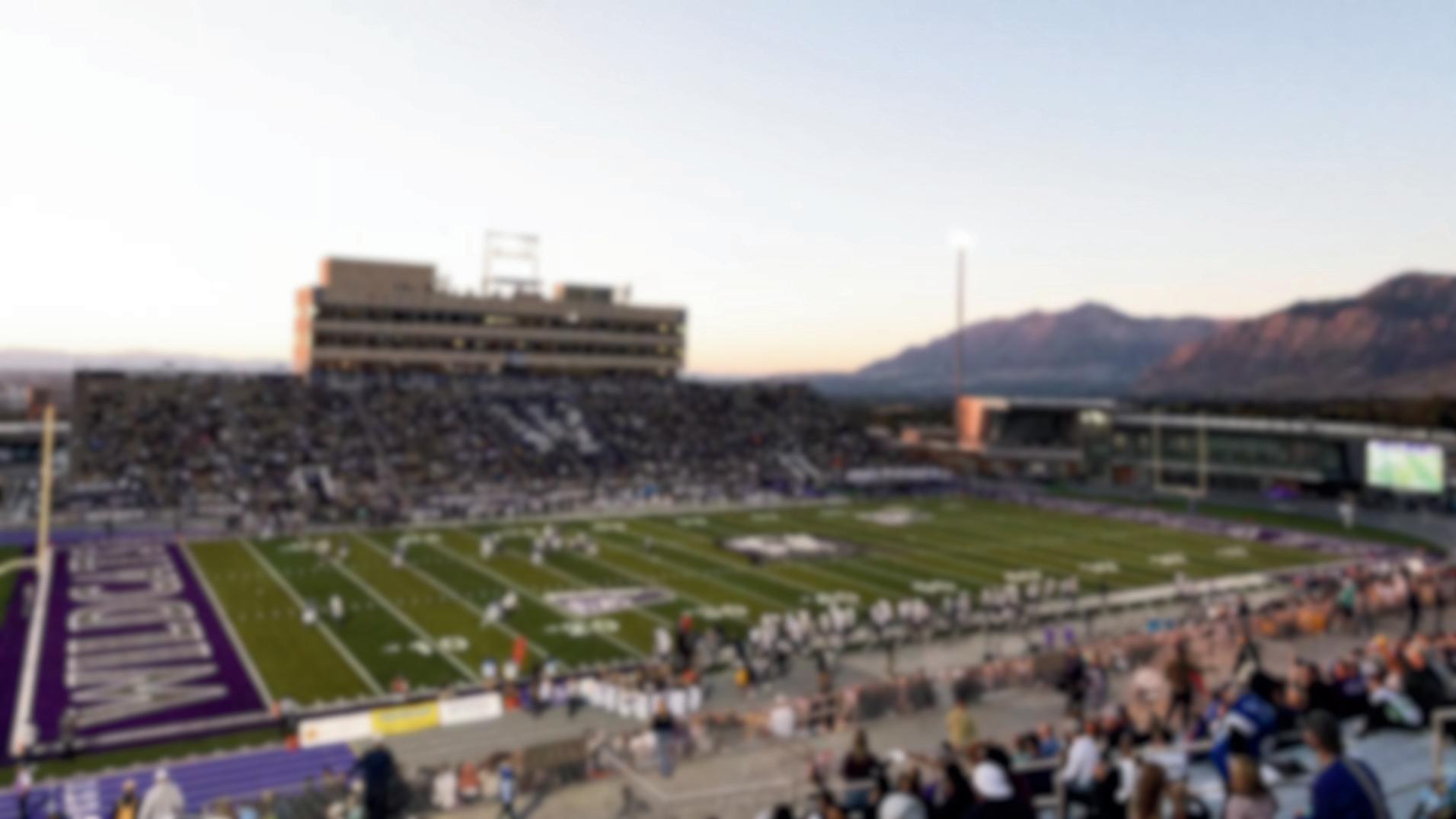


By SKYLAR WOLFE Reporter





S gnpost S gnpost THE THE






By SKYLAR WOLFE Reporter
Homecoming week was in full swing with alumni returning to campus and freshmen attending their first college homecoming events. Beyond the tailgates, dances and games, homecoming is more than just events. It’s a living expression of Weber State University’s identity.
“Homecoming itself is a celebration of Weber State pride and bleeding purple,” said Mia Foster, Weber State University Student Association Student Body President. “I think it really does show off why students come here and the excitement of the college experience itself.”
Foster added that the celebration also reaches beyond campus.
“I truly believe it’s reminding the surrounding area that we’re here, we’re proud, and the Wildcat family is continuing strong.” Foster said.
For alumni, homecoming carries a sense of return and reflection.
“It’s an opportunity to reflect on where you’ve come so far within the semester, for students, and then a chance to celebrate that,” 2017 graduate Jasmine Pittman said. “The overall understanding of what home-
coming is coming back to yourself. It’s coming back to a place that made you feel seen, heard, and safe, but also pushed you to be better and stronger than you were before.”
Foster said homecoming helps connect current students with alumni, strengthening Weber State’s sense of community.
“It’s neat hearing alumni or past students mentioning those different aspects to homecoming because it’s just such a monumental and nostalgic event,” Foster said.
Homecoming is a valued tradition, but that does not mean it will stay the same every year. If students have ideas for homecoming or other events WSUSA is always looking for suggestions.
Krystal Orantes, the vice president of WSUSA advocacy and unity team, said that they considered different student situations when planning events such as students who commute to campus using the bus system.
“This year, we took a lot of feedback to see when students would be able to go to events,” Orantes said. “Seeing past history events, to see how they’ve been able to succeed and how we can continue making them succeed even further and how we can expand the event so each student can attend something and still have that homecoming experience.”
Orantes said that homecoming can help each student showcase what they love to do in their own way. Events like light the W, the homecoming dance or the homecoming football game all provide these opportunities for students. These events can also give students a chance to meet new people and experience a fuller college experience.
“We have a whole bunch of international students this year, which is awesome, which means we have a bigger student base coming to these events … allowing them to experience college life,” Orantes said.
Dakoda Bird, a freshman at Weber State and the traditions chair for Weber’s Activities Team, said that homecoming is an American college culture that creates a community for the students.
“Homecoming, those big dances and the football games — that’s for sure a good way to bring everyone together.” Bird said.
Foster said that she’s seen many students joining in on the campus events.
“Just this week, we’ve seen an influx of students getting involved … It was super cool to see the students hanging out, having a good time and enjoying the college experience, especially during midterms,” Foster said.
Orantes added that homecoming gives students a chance to breathe.
“I hope this was an opportunity for everyone to at least take a breather … and have a moment where you can, at least, for an hour, pretend everything is fine,” Orantes said.
Pittman said that students need that in-person interaction to help them feel like their purpose is bigger than just going to class every day.
“It’s about having pride and joy in where you are and just having camaraderie with others who feel the same way,” Pittman said. The end of homecoming week isn’t the end of student focused activities at Weber State, they are held throughout the school year.
Coming to events on campus can do more than simply get students out of the house; they provide resources and opportunities that students might not have known were available to them.
“I feel that that’s what allows students to want to come to these events because they’re getting such an amazing opportunity, and they’re getting resources they potentially may have not known they could have grabbed,” Orantes said.


Students pose with their masks at the homecoming dance.
BOTTOM LEFT: Students and families with their children enjoy time at the pool during the Purple Pool Party.
BOTTOM RIGHT: Marcus Hollingsworth and Tessa Whimpey play the Light the W mini golf course.
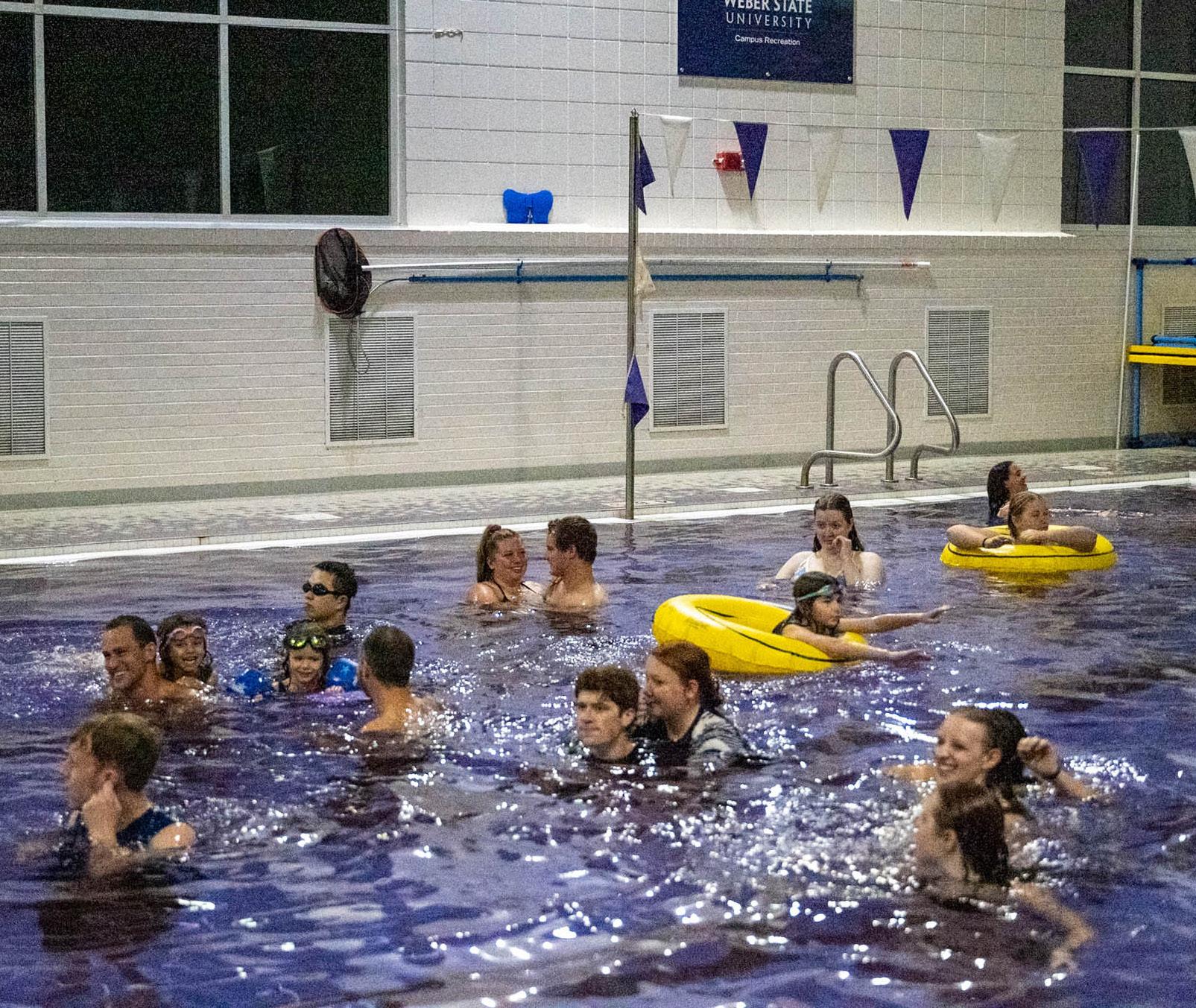

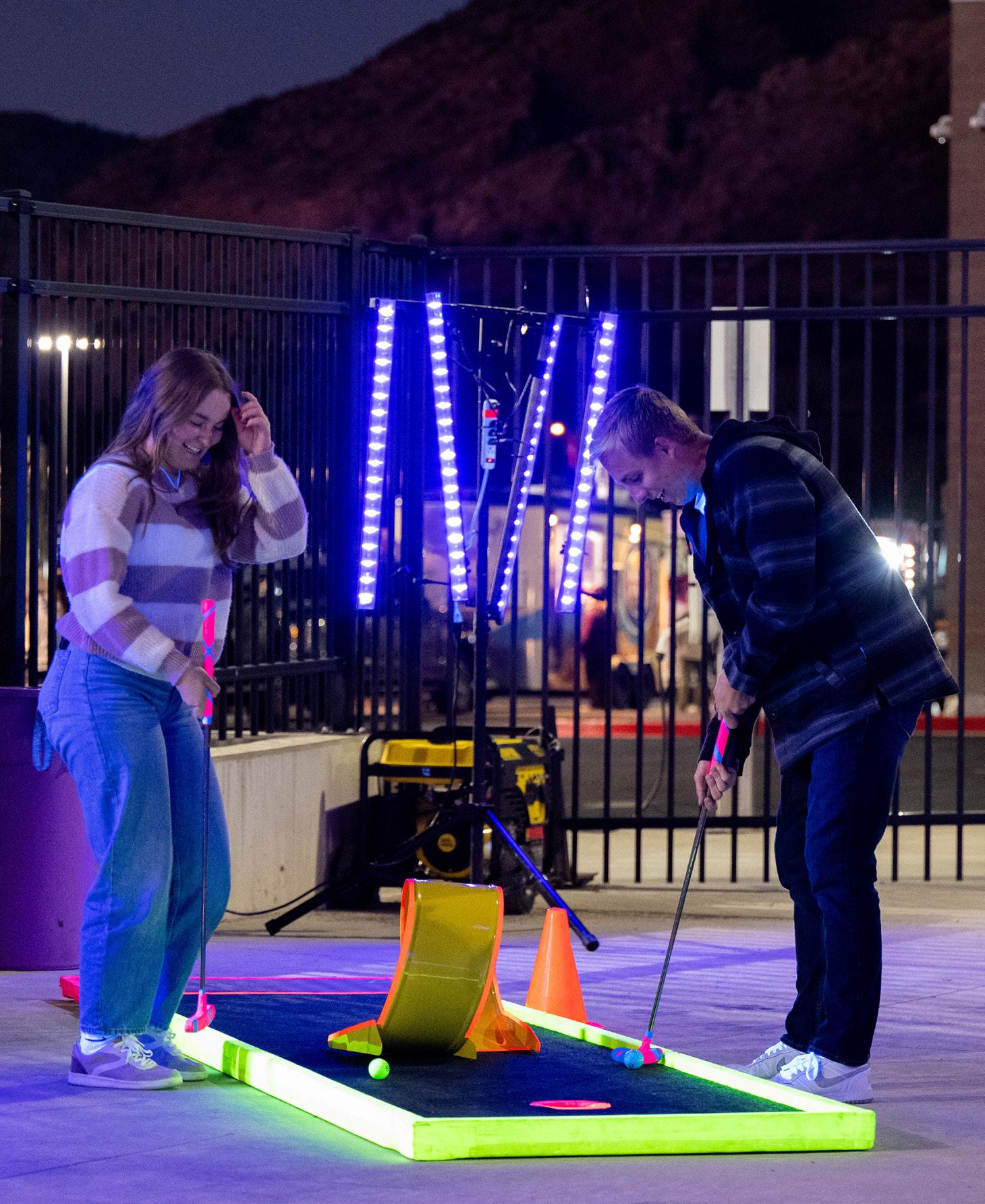
Traducido por DAVID ROMAN AROS Co-Editor
Por SKYLAR WOLFE Reportera
La semana de Homecoming estaba en pleno apogeo, con antiguos alumnos regresando al campus y estudiantes de primer año asistiendo a sus primeros eventos universitarios de bienvenida. Más allá de las fiestas, los bailes y los juegos, la bienvenida es mucho más que una simple serie de eventos. Es una expresión viva de la identidad de la Universidad Estatal de Weber.
“El Homecoming es una celebración del orgullo por la Universidad Estatal de Weber y del color morado”, afirmó Mia Foster, presidenta del cuerpo estudiantil de la Asociación de Estudiantes de la Universidad Estatal de Weber. “Creo que realmente muestra por qué los estudiantes vienen aquí y la emoción que supone la experiencia universitaria en sí misma”.
Foster también agregó que la celebración se extiende más allá de solo el campus.
“Creo sinceramente que esto le recuerda a los alrededores que estamos aquí, que estamos orgullosos y que la familia Wildcat sigue siendo fuerte”, afirmó Foster.
Para los antiguos alumnos, la reunión de antiguos alumnos conlleva una sensación de regreso y reflexión.
“Es una oportunidad para que los estudiantes reflexionen sobre lo que han logrado hasta ahora en el semestre y, a continuación, una ocasión para celebrarlo”, afirmó Jasmine Pittman, graduada en 2017. “La idea general de lo que significa el regreso a casa es volver a uno mismo. Es volver a un lugar que te hizo sentir visto, escuchado y seguro, pero que también te empujó a ser mejor y más fuerte que antes”.
Foster dijo que la reunión de antiguos alumnos ayuda a conectar a los estudiantes actuales con los antiguos alumnos, lo que refuerza el sentido de comunidad de Weber State.
“Es genial escuchar a los antiguos alumnos o exalumnos mencionar esos diferentes aspectos de la reunión de antiguos alumnos, porque es un evento tan monumental y nostálgico”, dijo Foster.
El Homecoming es una tradición muy apreciada, pero eso no significa que vaya a
ser igual todos los años. Si los estudiantes tienen ideas para el Homecoming u otros eventos, WSUSA siempre está abierta a sugerencias.
Krystal Orantes, vicepresidenta del equipo de defensa y unidad de WSUSA, dijo que al planificar eventos se tuvieron en cuenta las diferentes situaciones de los estudiantes, como los que se desplazan al campus utilizando el sistema de autobuses.
“Este año, recabamos muchas opiniones para saber cuándo podrían asistir los estudiantes a los eventos”, explicó Orantes. “Analizamos los eventos anteriores para ver cómo habían tenido éxito y cómo podíamos seguir mejorándolos, así como ampliar el evento para que todos los estudiantes pudieran asistir a algo y seguir disfrutando de la experiencia del baile de bienvenida”.
Orantes dijo que el Homecoming puede ayudar a cada estudiante a mostrar lo que le gusta hacer a su manera. Eventos como Light the W, el baile de Homecoming o el partido de fútbol americano de Homecoming brindan estas oportunidades a los estudiantes. Estos eventos también pueden darles la oportunidad de conocer gente nueva y vivir una experiencia universitaria más completa.
“Este año tenemos un montón de estudiantes internacionales, lo cual es fantástico, ya que significa que contamos con una base estudiantil más amplia que acude a estos eventos... lo que les permite experimentar la vida universitaria”, dijo Orantes.
Bird, estudiante de primer año en Weber State y responsable de tradiciones del equipo de actividades de Weber, dijo que el homecoming es una tradición universitaria estadounidense que crea una comunidad para los estudiantes.
“El Homecoming, esos grandes bailes y los partidos de fútbol americano... Sin duda, es una buena forma de reunir a todo el mundo”, dijo Bird.
Foster dijo que ha visto a muchos estudiantes participar en los eventos del campus.
“Esta misma semana hemos visto cómo se ha producido una afluencia de estudiantes que se han involucrado... Ha sido genial ver a los estudiantes pasando el rato, divirtiéndose y disfrutando de la experiencia universitaria, especialmente durante los exámenes parciales”, dijo Foster.
Orantes añadió que la vuelta al colegio
ofrece a los estudiantes la oportunidad de respirar.
“Espero que esto haya sido una oportunidad para que todos pudieran al menos tomarse un respiro... y tener un momento en el que, al menos durante una hora, pudieran fingir que todo está bien”, dijo Orantes.
Pittman dijo que los estudiantes necesitan esa interacción presencial para ayudarles a sentir que su propósito es más importante que simplemente asistir a clase todos los días.
“Se trata de sentir orgullo y alegría por el
lugar en el que estás y de compartir camaradería con otras personas que sienten lo mismo”, dijo Pittman.
Asistir a eventos en el campus puede aportar mucho más que simplemente sacar a los estudiantes de casa; les proporciona recursos y oportunidades que quizá no sabían que tenían a su alcance.
“Creo que eso es lo que hace que los estudiantes quieran asistir a estos eventos, porque les brinda una oportunidad increíble y les proporciona recursos que quizá no sabían que podían obtener”, dijo Orantes.



ARRIBA A LA IZQUIERDA: Skylar Collins, Delaney Pavelek y Cielo Morales hablando y riendo en la hora de la piscina morada.
ARRIBA A LA DERECHA: Drones tienen una presentación de luces mientras la W se ilumina para la semana de homecoming.
ABAJO: Estudiantes posan mientras hacen el logo de la W.


Scholarship Universe has WSU scholarships and approved nationwide scholarships that you are eligible for.

The free application takes about 10 minutes and is only done once at weber.edu/apply (Concurrent Enrollment students, complete your status switch during your senior year of high school using the “Status Switch” app in your eWeber portal or by visiting weber.edu/status.)


It only takes a few minutes and you only have to create it once. This account cannot be created until WSU has received your FAFSA.
This only takes a moment to report your planned enrollment, living arrangements and your interest in work study. This will help us award you more accurately.
It only takes about 30 minutes to complete. You complete FAFSA your senior year of high school and again every year that you will be in school. #1 #2 #3 #4 #5 FAFSA Get Admitted for FREE to Weber State University Financial Aid Verify Fill out the Planned Enrollment Levels Scholarships
Scholarship Universe will match you with potential WSU and approved nationwide scholarships based on your profile and FAFSA information. All you have to do is apply for the scholarships you choose.
Incoming students are automatically considered for academic scholarships but should complete their Scholarship Universe Profile to find more.
weber.edu/pay-for-school










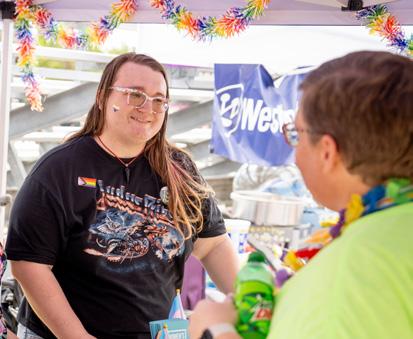




By AISHA RUCKER Reporter
Hispanic Area Council, otherwise known as HAC, has been a Weber State University student-organized club for over 9 years. The council consists of Anayeli Rodriguez as President, Julian Martinez as Vice President and Erica Maculi as Treasurer.
The Hispanic Area Council hosts events to promote and celebrate Hispanic Culture. HAC has been hosting events for this year’s Hispanic Heritage Month, including lotería and a workshop on the significance of La Catrina for the Day of the Dead. With the event, the club has been able to get many students to connect on campus.
The HAC was one of the many clubs that were affected by House Bill 261.
House Bill 261’s general description, taken from the bill itself states, “This bill pro-
hibits an institution of higher education, the public education system and a governmental employer from taking certain actions and engaging in discriminatory practices.”
Since the bill has been in place, HAC has had to do a lot of restructuring and changes to their posters and what they put out. “Our events and club are open to all people. We have never been exclusionary,” Rodriguez said.
The area council, which was sanctioned under the Office of Multicultural Excellence, is not operated under the Student Success Center, leaving students no physical space to conduct events and activities.
“We’re just in a middle space right now. Because of that, because we don’t actually have a physical center, but a physical space, it’s hard to promote, and it’s hard to put ourselves out there,” Rodriguez said. HAC said

that they have been relying on Instagram and flyers to promote their club.
Though many clubs like HAC have never been an exclusive club, Weber State still pushed for them to be open for all and not discriminate against people. “There was an event for Hispanic Heritage Month last year where we had three guest speakers, and I think the title is something like ‘Women in Leadership.’ And we had to change the name because ‘women’ is considered inappropriate,” Rodriguez said.
When hosting an event last spring, “Know Your Rights,” Rodriguez said she and her crew were told not to host the event on Weber State property due to them possibly getting defunded. They could not get a hold of lawyers due to the overwhelming immigration cases.
”One of the pressures we face after HB 261
is censorship and defunding,” Rodriguez said. “As the Unity Conference, and the banning of red cards on campus have shown, if the University and legislators disagree with something, they will shut us down.”
Since Hispanic Heritage month has started the club has been nothing but grateful for the support they have received, with ABC and FOX 13 interviewing and writing articles.
“I hope that people, not only those same people that have been supporting us, also support the Native Americans, the LGBTQ and all other minorities,” Rodriguez said. “Even though Hispanic Heritage Month is at the beginning of the school year, there’s still a lot more heritage months to come after. And so I really hope that people also come and support them because it’s not just us that are being affected with the DEI, it’s everybody.”

Traducido por DAVID ROMAN AROS
Co-Editor
Por AISHA RUCKER Reportera
El Consejo del Área Hispana, también conocido como HAC, es un club organizado por estudiantes de la Universidad Estatal de Weber desde hace más de nueve años. El consejo está formado por Anayeli Rodríguez como presidenta, Julián Martínez como vicepresidente y Erica Maculi como tesorera.
El Consejo del Área Hispana organiza eventos para promover y celebrar la cultura hispana. El HAC ha organizado eventos para el Mes de la Herencia Hispana de este año, entre los que se incluyen una lotería y un taller sobre el significado de La Catrina para el Día de los Muertos. Con este evento, el club ha conseguido que muchos estudiantes se relacionen en el campus.
El HAC fue uno de los muchos clubes afectados por el proyecto de ley 261 de la Cámara de Representantes.
La descripción general del proyecto de ley 261 de la Cámara de Representantes, tomada del propio proyecto de ley, establece lo siguiente: “Este proyecto de ley prohíbe a las instituciones de educación superior, al sistema de educación pública y a los empleadores gubernamentales tomar determinadas medidas y participar en prácticas discriminatorias”.
Desde que se aprobó la ley, HAC ha tenido que realizar numerosos cambios y reestructuraciones en sus carteles y en lo que publican. “Nuestros eventos y nuestro club están abiertos a todo el mundo. Nunca hemos sido excluyentes”, afirmó Rodríguez.
El consejo de área, que fue sancionado por la Oficina de Excelencia Multicultural, no funciona bajo la dirección del Centro de Éxito Estudiantil, lo que deja a los estudiantes sin un espacio físico para llevar a cabo eventos y actividades.
“Ahora mismo nos encontramos en una situación intermedia. Debido a ello, como
no tenemos un centro físico, sino un espacio físico, nos resulta difícil promocionarnos y darnos a conocer”, afirmó Rodríguez. HAC afirmó que han estado utilizando Instagram y folletos para promocionar su club.
Aunque muchos clubes como el HAC nunca han sido exclusivos, la Universidad Estatal de Weber siguió presionando para que estuvieran abiertos a todos y no discriminaran a nadie. “El año pasado se celebró un evento con motivo del Mes de la Herencia Hispana en el que contamos con tres ponentes invitadas, y creo que el título era algo así como “Mujeres en el liderazgo”. Tuvimos que cambiar el nombre porque se consideraba inapropiado el término ‘mujeres’, explicó Rodríguez.
Cuando organizó un evento la primavera pasada, “Conoce tus derechos», Rodríguez dijo que a ella y a su equipo les dijeron que no organizaran el evento en las instalaciones de la Universidad Estatal de Weber debido a que podrían perder su financiación. No pudieron ponerse en contacto con abogados debido a la abrumadora cantidad de casos de inmigración.
“Una de las presiones a las que nos enfrentamos tras la HB 261 es la censura y la retirada de fondos”, afirmó Rodríguez. “Como han demostrado la Conferencia de la Unidad y la prohibición de las tarjetas rojas en el campus, si la Universidad y los legisladores no están de acuerdo con algo, nos cerrarán”.
Desde que comenzó el Mes de la Herencia Hispana, el club no ha dejado de mostrar su agradecimiento por el apoyo recibido, con entrevistas y artículos en ABC y FOX 13.
“Espero que la gente, no solo aquellos que nos han estado apoyando, también apoyen a los nativos americanos, a la comunidad LGBTQ y a todas las demás minorías”, dijo Rodríguez. “Aunque el Mes de la Herencia Hispana es al comienzo del año escolar, aún quedan muchos otros meses de la herencia por venir. Por eso, realmente espero que la gente también venga y los apoye, porque no solo nosotros nos vemos afectados por la DEI, sino todos”.
ARRIBA: Brazaletes coloridos desplegados para la demostración.
MEDIO: El mes de las festividades de herencia hispana termina el 14 de Oct.
ABAJO: Todos los cubículos tenian elementos unicos a la venta.
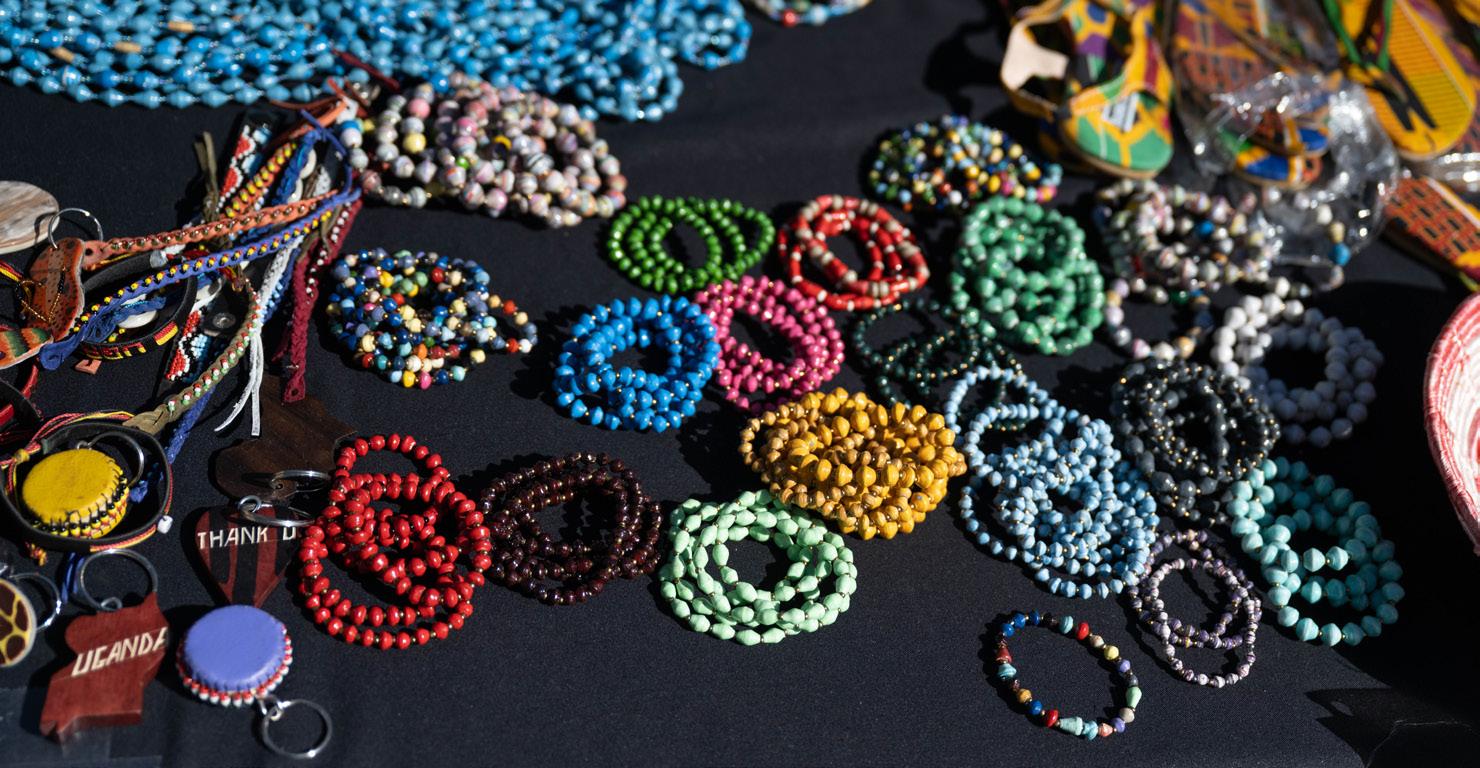


By HENRY CRAIG Reporter
Trespassers on the mountain
On Sept. 23, Weber State University Police Department officers spotted three unknown individuals hiking around the “Flaming W” on the mountainside above campus. An officer attempted to make contact with the individuals, but they did not respond. Eventually the officer made the hike up to the “W” but the individuals were nowhere to be found.
On Sept. 23, a deer was found wounded in between the Weber County Ice Sheet and the Jamba Juice located on Harrison Boulevard. After officers contacted the wildlife
authority the deer was dealt with.
On Sept. 26, two youths were spotted riding electric bikes recklessly along Old Post Road, failing to stop at stop signs. By the time police arrived the individuals could not be found.
On Sept. 26, Weber State University police got a vagrancy report on the west side of the Ice Sheet. Officers deal with issues of homelessness by requesting the unhoused to vacate the area, officers will also point the unhoused in the direction of various resources such as the Lantern House or the Ogden Homeless Advocates.
On Sept. 29, a dog was left unattended in a car in the A2 parking lot. The windows were cracked and the dog was not in distress. Upon speaking with the owner officers learned the dog had issues being left alone at the owner’s apartment. Officers advised the owner on resources to help train the dog.
On Sept. 29 a Weber State employee reported two individuals engaging in lewd acts at the old frisbee golf course behind the Ice Sheet. The report came in at 12:15 p.m. and the officers are in the process of reaching out to the parties involved.
Cope with depression and/or anxiety
Improve relationships
Build self-esteem
Resolve grief
Explore other concerns
On Sept. 30, suspicious circumstances were reported via Code Purple at the fitness center. Upon investigation officers found nothing suspicious. The report came from an individual with a history of making false allegations without malicious intent.
On Sept. 30 at 10:47 p.m. on 4600 S and Harrison Boulevard, an individual was pulled over for speeding. The officers found a joint and other drug paraphernalia in the car, though there was no evidence that the individual was under the influence while driving. The drugs were confiscated and destroyed.
801-626-6406 weber.edu/CounselingCenter
WSU Davis: Building D2, Room 262
WSU Ogden: Student Services Center, Suite 280
Free care for common illnesses and injuries, select lab testing, reproductive healthcare, physical exams and more.

Por IVANNA OLACHEA GONZALEZ Traductora
Por HENRY CRAIG Reportero
Intrusos en la montaña
El 23 de septiembre, oficiales del Departamento de Policía de la Universidad de Weber State localizaron a tres individuos desconocidos caminando alrededor de la “Flaming W” en la ladera de la montaña sobre el campus. Un oficial intentó hacer contacto con los individuos, pero ellos no respondieron. Eventualmente el oficial hizo la caminata hasta la “W” pero los individuos no se encontraban por ninguna parte.
Ciervo herido
El 23 de septiembre, un ciervo herido fue encontrado entre la capa de hielo del condado de Weber y el local de Jamba Juice
situado en Harrison Boulevard. Después de que los oficiales contactaron a la autoridad de vida silvestre ellos se ocuparon del ciervo.
Conducción imprudente
El 26 de septiembre, se vio a dos jóvenes conduciendo bicicletas eléctricas imprudentemente por Old Post Road, fallando al detenerse en las señales de alto. Cuando llegó la policía los individuos no se pudieron encontrar.
Campamentos de personas sin hogar
El 26 de septiembre, la policía de la Universidad de Weber State recibió un reporte por vagabundeo en el lado oeste de la capa de hielo. Oficiales se ocupan de los problemas de las personas sin hogar solicitando a las personas que desalojen la zona, los oficiales también indican a las personas sin hogar donde pueden encontrar diversos recursos, como la casa de la linterna o los defensores
de las personas sin hogar en Ogden.
Cachorro!
El 29 de septiembre, un perro fue dejado sin supervisión en un carro en el estacionamiento A2. Las ventanas estaban medio abiertas y el perro no estaba angustiado. Al hablar con el dueño los oficiales aprendieron que el perro tenía problemas con quedarse solo en el apartamento del propietario. Los oficiales aconsejaron al dueño sobre los recursos disponibles para ayudar a entrenar al perro.
Actos obscenos
El 29 de septiembre un empleado de Weber State reportó a dos individuos cometiendo actos obscenos en el antiguo campo de frisbee golf situado detrás de la pista de hielo. El reporte llegó a las 12:15 p.m. y los oficiales están en el proceso de ponerse en contacto con las fiestas involucradas.
Reportes falsos
El 30 de septiembre, circunstancias sospechosas fueron reportadas a través del Codigo Purpura en el gimnasio. Tras la investigación los oficiales no encontraron nada sospechoso. El reporte vino de un individuo con un historial de realizar acusaciones falsas sin intención maliciosa.
Exceso de velocidad
El 30 de septiembre a las 10:47 p.m. en 4600 S y Harrison Boulevard, un individuo fue detenido por exceso de velocidad. Los oficiales encontraron un porro y otros utensilios para consumir drogas en el carro, aunque no había pruebas de que el individuo estaba bajo los efectos mientras manejaba. Las drogas fueron confiscadas y destruidas.


By JAMES GORDON Managing Editor
At the start of the fiscal year, on Oct. 1, the federal government shut down after congress failed to reach an agreement on the federal budget, sending a ripple across federal governments throughout the country. As the shutdown lingers, thousands of federal workers are forced to go home without a paycheck.
Every year, Congress must pass annual funding measures known as appropriations, which cover the costs of the day-to-day operations of the federal government. These appropriations include programs such as Social Security and Medicare, known as mandatory spending.
This also covers discretionary spending: money the government uses for departments and agencies such as the military, national parks, U.S. Postal Service and other services the government needs to function.
To pass these spending bills, the Senate needs 60 members to agree to the appropriation, a higher threshold than the current 51-49 split. Even if one party holds a narrow majority, they still need bipartisan cooperation from the other side to get spending bills passed.
Gary Johnson, a Weber State University political science professor, said shutdowns like these stem from political polarization, sparking a series of finger-pointing at the early stages of a shutdown.
“I want to make it clear that one of the big problems here is a legislative versus executive argument about what the next year’s federal budget will be,” Johnson said. “And in our increased stage of partisanship and polarization, that typically is the two parties arguing as well.”
When Congress can’t reach an agreement, the effects ripple beyond Washington.
When a shutdown occurs, federal employees are furloughed, meaning they are temporarily sent home without pay. Essential or “excepted” workers continue to work during the shutdown. This includes Transportation
Security Administration agents, air-traffic controllers, postal workers, military personnel and more.
These sweeping effects can also be felt by other public lands or national services, such as National Parks, that generate their own revenue but still depend on federal oversight.
“In some cases, national parks or lots of
your 25th Street, restaurants, things like that,” Keinsley said. “Usually, the impacts are pretty minute. They’re pretty small, and they’re not long lasting.”
Keinsley said a government shutdown on its own is not a concern, rather it is about how long a shutdown lasts.
“Unless this goes past the two week, three week mark, you’re probably not going to see

federal employees, they’re just sitting at home. And then when they come back to work, they got paid for sitting at home,” Johnson said. “And some workers had to work that whole time, and not just do their jobs but somebody else in their office’s job as well. So you can see how it’s terrible for morale for civil servants.”
Andrew Keinsley, a Weber State economics professor, said these impacts not only affect federal employees, but anyone working under government contracts as well. This can affect private contractors like Northrop Grumman near Hill Air Force Base, as well as local stores and restaurants, where federal employees stream revenue into local businesses.
“So that’s missing business, probably from
much of an impact because you’re not going to see a lot of paychecks missed,” he added. “Once you’ve really started making people skip a paycheck, then it just depends on how much some of these families have saved up. Again, these have been happening more often, so you think that a lot of these families would be planning for that possibility, but you never know.”
In the last 45 years, the U.S. has seen 11 shutdowns, the longest lasting 35 days under President Trump’s first term. Two weeks after the shutdown, Trump signed The Government Employee Fair Treatment Act of 2019, an act that requires all federal employees, furloughed or working without pay, to receive full back pay once a shutdown ends.
Since the most recent shutdown, Trump
has commented on changing this decision, saying some federal workers do not deserve compensation. “But for the most part, we’re going to take care of our people. There are some people that really don’t deserve to be taken care of and we’ll take care of them in a different way,” Trump said to reporters at the White House.
Johnson said Congress often relies on short-term measures called “continuing resolutions” to keep the government funded.
“Congress is in charge of the budget and they ought to be able to run the day-to-day operations of the government,” Johnson said. “There are over 90,000 governments in the United States. Only the federal government is in debt, and it’s $35 trillion in debt. Every other city, and county and state has to balance its budget, but Congress can’t seem to do that.”
Johnson added to this statement saying shutdowns like these undermine the integrity and legitimacy of the federal government, leading to upset voters.
“Voters don’t like it because most of us know someone who works for the federal government. If you’re Southern Utah, your business suffers if the national parks are shut down,” Johnson said. “They also managed to have government shutdowns that aren’t quite complete shutdowns because certain segments of the electorate and the population simply depend upon those checks for their own living, right? They’re not going to eat if they don’t get their Social Security check.”
As the shutdown awaits a solution, many agencies continue operating without pay, leaving workers and citizens waiting for Congress to find common ground.
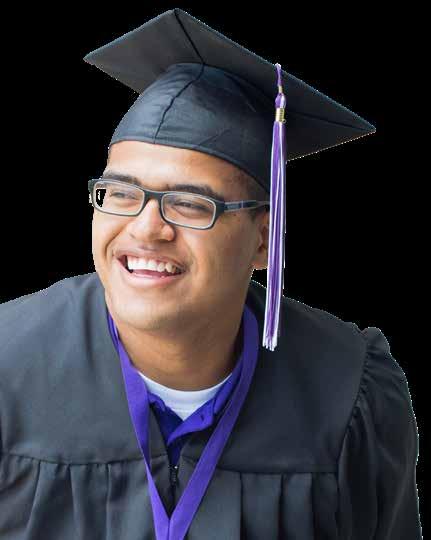


By GRAYSON FREESTONE Reporter
Weber State University volleyball continued their home stand with two wins against Eastern Washington University and the University of Idaho, bumping their record to 12–5 before an extended road trip.
Weber State vs. Eastern Washington
The Wildcats came out flying against the Eagles. After shaking off a quick point by the Eagles to open, the Wildcats scored nine of the next 10 points with dominant play at the net, leading to a 25–11 win and an early 1–0 advantage.
However, momentum quickly dissipated in set two. Weber came out flat, while the Eastern Washington flipped things around and jumped out to a quick 8–2 lead.
The Wildcats slowly fought back to tie it 24–24, but they were never able to take a lead, resulting in a 26–24 loss.
Head Coach Jeremiah Larsen was displeased with his team’s performance after dominating early on.
“I didn’t like set two at all,” Larsen said. “(EWU) played harder in the second set, and we took way too long to respond to their effort.”
Nevertheless, he was complimentary of how everyone responded to hardship, saying, “I’m happy with how our team responded through adversity … We didn’t scream and yell at each other. We just said, ‘Hey, this is not who we are. We know we can play more disciplined volleyball.’ And they settled into their identity. And the next thing you know, we were starting to take off.”
“It was just being able to come back together, rely on each other and refocus … Going into the third set, it gave us that much more motivation to be focused on what we needed to accomplish,” said senior outside hitter Kaylie Ray.
They did just that, going on to win the next two sets, 25–15 and 25–19, to win their 11th game of the season.
The team was looking forward to Saturday’s annual alumni game against Idaho.
“It’ll be fun to see old players, players that played here before me, players that played
for me,” Larsen said. “I always like alumni weekend because I have a lot of good memories about those players and what they’ve done for our program.”
Many familiar faces were on the scene for the Nancy Weir Alumni Match, including many former players, former assistant athletic trainers and Hall of Famer Nancy Weir.
Larsen specifically mentioned Weir and the decision to name the match after her, saying, “We wanted to name it because Nancy Weir is Weber State volleyball.”
As for the game, despite a 25–18 win in
the first set, the Wildcats made some early mistakes. However, they called on the lessons they learned against Eastern Washington to clean things up and play like they are capable of.
“I think it helped a lot because it showed us what can happen when we lose our focus,” said junior middle blocker Stacia Barker. “And then we can prove to ourselves what can happen when we are together.”
“It’s nice to get a sweep,” Larsen said. “I think we respected them, something we didn’t do a very good job against Eastern Washington.”
“We still have opportunities to get better
because they are playing good volleyball and they’re going to pose some unique challenges which we need to figure out how to deal with,” Larsen said.
“I’m super humbled by all the alumni that came back,” Larsen said. “And I’m excited about all the people that came to watch.”

Por LUNA MALAGON SOLORZANO Traductor
Por GRAYSON FREESTONE Reportero
El equipo de la Universidad de Weber State continúa su racha en casa con dos victorias contra la Universidad del Este de Washington y la Universidad de Idaho, lo que elevó su récord a 12-5 de una larga gira.
Weber State vs. Eastern Washington
Las Wildcats salieron con fuerza contra los eagles. Tras apuntar rápidamente un punto inicial de los Eagles, los Wildcats anotaron nueve de los siguientes diez puntos con un juego dominante en la red, lo que les llevó a liderar el marcador a una victoria de 25-11 y una ventaja inicial de 1-0.
Sin embargo, el impulso se disipó rápidamente en el segundo set. Weber salió sin energía, mientras que Eastern Washington le dio la vuelta al partido y cambió las cosas rápidamente poniéndose en ventaja 8-2.
Los Wildcats lucharon lentamente para empatar 24-24 pero no fueron capaces de retomar el mando, lo que los llevó a perder 26-24.
El entrenador Jeremiah Larsen se mostró descontento con el rendimiento de su equipo tras liderar al principio.
“No me gustó para nada el segundo set”, dijo Larsen. “(EWU) jugó duro en el segundo set, y nos tomó demasiado tiempo responder a eso”.
Sin embargo, elogió la forma en que todos respondieron a las dificultades, diciendo, Estoy feliz de cómo nuestro equipo respondió a la adversidad… No nos gritamos ni nos insultamos entre nosotros. Solo dijimos, ‘Hey, esto no es lo que somos. Sabemos que podemos que podamos jugar voleibol con más disciplina.’ Y se acomodaron en su identidad. Y, antes de que nos diéramos cuenta, empezamos a despegar”.
“Solo fue ser capaces de unirnos otra vez, apoyarnos las unas a las otras y enfocarnos…. El tercer set, nos dio mucha más motivación para estar enfocados en lo que necesitábamos lograr”, dijo la atacante exterior senior Kaylie Ray.
Y eso fue precisamente lo que hicieron, ganando los dos siguientes sets por 25-15 y 25-29, para sumar su undécima victoria de la temporada.
El equipo espera con ilusión el partido anual de antiguos alumnos del sábado contra Idaho.
“Va a ser divertido ver antiguas jugadoras, jugadoras que jugaron antes que yo, jugadoras que jugaron para mi”, dijo Larsen. “Siempre me ha gustado la semana de antiguos alumnos porque tengo muchos bue-

nos recuerdos de esos jugadores y de lo que han hecho en nuestro programa”.
Muchas caras conocidas estuvieron presentes en el partido de antiguos alumnos de Nancy Weir, entre ellas muchas ex jugadoras, entrenadores asistentes y la miembro del salón de la Fama Nancy Weir.
Larsen específicamente nombró a Weir y su decisión de nombrar el partido a su nombre diciendo, “Queremos nombrar porque Nancy Weir es el voleibol de Weber State”.
En cuanto al partido, a pesar de ganar el primer set por 25-28, los Wildcats cometieron algunos errores al principio. Sin embargo, aplicaron las lecciones aprendidas contra Eastern Washington para enderezar el rumbo y jugar como saben hacerlo.
“Creo que ayudó bastante porque nos mostró lo que puede pasar cuando perdemos la concentración”, dijo la bloqueadora junior Stacia Barker. “Y entonces demostrarnos
a nosotros mismos lo que puede suceder cuando estamos juntos”
“Es agradable conseguir una victoria aplastante”, dijo Larsen. “Creo que les respetamos, algo que no hicimos muy bien contra Eastern Washington”.
“Vamos a seguir teniendo oportunidades de mejorar, porque están jugando buen voleibol y nos van a plantear algunos retos únicos que tendremos que aprender a afrontar”, afirmó Larsen.
“Me siento muy honrado por todos los antiguos alumnos que han vuelto”, declaró Larsen. “Y estoy muy emocionado por toda la gente que ha venido a vernos”.
El equipo femenino de Volleyball habla con su coach para planear una jugada antes de que vuelvan a la cancha.

By GAVIN NELSON Editor
After an hour and forty-five-minute weather delay, the Weber State University Wildcat football team lost to the California State University, Sacramento Hornets in a game in which heavy rain and wind played a huge factor.
After starting quarterback Jackson Gilkey broke his leg against the University of California, Davis on Sept. 27, along with backup quarterback Cash McCollum breaking his hand at practice prior to the Butler University game on Sept. 20, third-string quarterback Dijon Jennings made his first career start against the Hornets.
Sacramento started with the ball, but the Wildcat defense forced a punt after a threeand-out. Weber got the ball, but an overthrown ball by Jennings on third down led to a punt of their own.
After another three-and-out by the Hornets, the Wildcats drove down the field in a drive that looked promising, but after Jennings missed senior receiver Marvin Session in the end zone, senior kicker Sloan Calder came out and hit a 52-yard field goal, which was his career long.
Sacramento State came back out and drove
down the field, with big runs from junior quarterback Cardell Williams. Williams’s 10yard rushing touchdown gave the Hornets a 7–3 lead at the end of the quarter.
In the second, Weber struggled to get yards, leading to a punt, but sophomore punter Henry Way’s attempt barely went off his foot, leading to the Hornets getting the ball at Weber State’s 14-yard line.
The Hornets took advantage and scored, giving them a 14–3 lead. The teams traded drives until Sac State got the ball back and Williams scored another rushing touchdown, this one 51 yards, making it 21–3.
On their next drive, the Wildcats ran the ball well, and helped by costly penalties by the Hornets, scored with a rushing touchdown from Jennings. Making the score 21–10 with four minutes left in the half.
On the next Hornet drive, they scored another touchdown, making it 28–10 at the half.
The Wildcats received the ball at half, but after a negative run and a sack, the Hornets got the ball back and scored yet another touchdown, making it 35–10.
The Wildcats then drove down to the Hornets’ 31-yard line but had to settle for a field goal, which Calder hit from 48 yards out to make it 35–13.
After stopping the Hornets, the Wildcats
scored on a touchdown pass from Jennings to sophomore running back Chauncey Sylvester to make it 35–20 to end the quarter.
However, the Hornets responded, driving all the way down the field, culminating in yet another Williams rushing touchdown, his third of the game, making the game 41–20.
On the next drive, Jennings found senior tight end Noah Bennee, who outjumped two Hornet defenders to come down with the ball on the Sac State 5-yard line. On the next play, Sylvester found the edge and scored his second touchdown to make it 41–27 with less than nine minutes left.
However, on the following kickoff, Hornet kick returner Rodney Hammond Jr. ran the kickoff back 99 yards for a touchdown to give the Hornets a 47–27 lead.
The Wildcats were unable to do anything on the following drive, getting stopped on fourth down. The Hornets drove down the field and scored another touchdown to finish the game off with a 55–27 win.
The Hornets’ running game was dominant, with three players rushing for over 100 yards.
Jennings finished with 157 passing yards and one touchdown on the day, while Sylvester finished with 137 yards from scrimmage and two total touchdowns.
“Every day, I don’t always feel 100, but I know I’m going to have to prepare myself

for Saturdays,” Sylvester said. “It feels good to get back out there and get back into the groove of things. I just always stay ready for opportunities like this”.
Earlier in the week, Head Coach Mickey Mental stated that both Jennings and backup quarterback Kingston Tisdell would play, but Tisdell did not see the field.
“I didn’t want to put Kingston in a bad situation. Gave Dijon the first quarter, and then we’re going against the wind with heavy rain. I don’t think it’s fair to that kid, to throw him in a situation like that,” Mental said.
The Wildcats will next travel to Portland, Oregon, to take on the Portland State University Vikings on Oct. 18 at 3 p.m.

The Weber State University football team runs onto the field for the homecoming game in the rain.

Traducido por VICTORIA HERNANDEZ
Co-Editora
Por GAVIN NELSON Editor
Después de una demora de 1 hora y 45 minutos, los Wildcats del fútbol americano de la Universidad de Weber State perdió ante la Universidad de California State, Sacramento Hornets en un juego donde la lluvia pesada y el viento fueron un gran factor.
Después de que el quarterback titular Jackson Gilkey se rompiera la pierna contra la Universidad de California, Davis, el 27 de septiembre, y que el quarterback suplente Cash McCollum se rompiera la mano durante un entrenamiento previo al partido contra la Universidad de Butler el 20 de septiembre, el quarterback suplente Dijon Jennings debutó como titular contra los Hornets.
Sacramento comenzó con el balón, pero la defensa de los Wildcats forzó un punt tras un three-and-out. Weber consiguió el balón, pero un lanzamiento demasiado largo de Jennings en tercera oportunidad llevó a su propio punt.
Después de otro three-and-out por los Hornets, los Wildcats corrieron por el campo con un jugada que parecía prometedora, pero después de que Jennings no alcanzara al wide receiver sénior Marvin Session en la zona de anotación, el pateador sénior Sloan Calder salió y anotó el gol de campo de 52 yardas, el más largo de su carrera.
Sacramento State volvió al campo y avanzó con grandes carreras del quarterback junior Cardell Williams. El touchdown de 10 yardas de Williams le dio a los Hornets una ventaja de 7-3 al final del cuarto.
En el segundo cuarto, Weber tuvo dificultades para ganar yardas, lo que llevó a un punt, pero el intento del pateador de segundo año Henry Way apenas salió de su pie, lo que llevó a los Hornets a recuperar el balón en la yarda 14 de Weber State.
Los Hornets aprovecharon la oportunidad y anotaron, lo que les dio una ventaja de 143. Los equipos intercambiaron jugadas hasta que Sac State recuperó el balón y Williams anotó otro touchdown por carrera, esta vez de 51 yardas, poniendo el marcador en 21-3.
En su siguiente jugada, los Wildcats corrieron bien con el balón y, ayudados por costosas penalizaciones de los Hornets, anotaron con un touchdown de Jennings. El marcador quedó 21-10 a cuatro minutos del descanso.
En la siguiente jugada de los Hornets, anotaron otro touchdown, dejando el marcador en 28-10 al descanso.
Los Wildcats recibieron el balón en la mitad, pero tras una carrera negativa y un sack, los Hornets recuperaron el balón y anotaron otro touchdown, poniendo el marcador en 35-10.
Los Wildcats avanzaron hasta la yarda 31 de los Hornets, pero tuvieron que conformarse con un field goal, que Calder anotó desde 48 yardas para poner el marcador en 35-13.
Tras detener a los Hornets, los Wildcats anotaron con un pase de touchdown de Jennings al corredor de segundo año Chauncey Sylvester, poniendo el marcador en 35-20 al final del cuarto.
Sin embargo, los Hornets respondieron, avanzando por todo el campo y culminando con otro touchdown de Williams, el tercero del partido, poniendo el marcador en 41-20.
En la siguiente jugada, Jennings encontró al senior tight end Noah Bennee, quien saltó por encima de dos defensas de los Hornets para atrapar el balón en la yarda 5 de Sac State. En la siguiente jugada, Sylvester encontró el hueco y anotó su segundo touchdown, poniendo el marcador en 41-27 a menos de nueve minutos del final.
Sin embargo, en el siguiente kickoff, el pateador de los Hornets, Rodney Hammond Jr., corrió 99 yardas y anotó un touchdown, lo que dio a los Hornets una ventaja de 47-27.
Los Wildcats no pudieron hacer nada en la siguiente jugada, quedando detenidos en la cuarta oportunidad. Los Hornets avanzaron por el campo y anotaron otro touchdown para terminar el partido con una victoria por 55-27.
El juego ofensivo de los Hornets fue dominante, con tres jugadores corriendo más de 100 yardas.
Jennings terminó con 157 yardas por pase y un touchdown en el día, mientras Sylvester quien terminó con 137 yardas desde la línea de scrimmage y dos touchdowns en total.
“No todos los días me siento al 100 %, pero
sé que tengo que prepararme para los sábados”, dijo Sylvester. “Me siento bien al volver al campo y retomar el ritmo. Siempre estoy preparado para oportunidades como esta”.
A principios de esta semana, el entrenador Mickey Mental declaró que tanto Jennings como el quarterback suplente Kingston Tisdell jugarían, pero Tisdell no salió al campo.
“No quería poner a Kingston en una mala situación. Le di el primer cuarto a Dijon y luego tuvimos que jugar contra el viento y bajo
una fuerte lluvia. No creo que sea justo para ese chico meterlo en una situación así”, dijo Mental.
Los Wildcats viajarán ahora a Portland, Oregón, para enfrentarse a los Vikings de la Universidad de Portland State el 18 de octubre a las 3 de la tarde.
BJ Carey (#3), defensa de Weber State University.

By WILL NAUGHTON Reporter
Weber State University’s women’s soccer team slumped away from home and lost 4–0 against the University of Montana on Oct. 9 in Missoula. At South Campus Stadium, the Wildcats could not bounce back from their 1–0 home defeat to Portland State University and made it two conference losses in a row. With this win, Montana climbed to the top of the Big Sky table through doubles from both Reagan Brisendine and Maycen Slater. Grizzly forward Eliza Bentler likewise let her attacking qualities shine with two assists off the bench.
In the dying minutes of the first half, Montana midfielder Caylee Kerr played the ball into the box following a Wildcat clearance and found Slater, who took a touch to control before scoring with the outside of her right foot.
Just shy of the hour mark, Griz midfielder Chloe Seelhoff hooked in a cross from the right wing toward the head of forward Taija Anderson, who cushioned the ball down to Brisendine for a
close-ranged finish.
Minutes later, Brisendine bagged Montana’s third of the afternoon on the back of Bentler’s line-breaking pass. One-on-one with the goalkeeper, Brisendine kept her cool and fired home with her left foot.
With just 10 minutes left on the clock, Bentler’s creative tendencies again made the difference as she cut the ball back across the box and along the ground to Slater, who was positioned at the far post to score her second of the afternoon
Although Weber State did not find the back of the net, they let off 15 shots to Montana’s 13.
“If stats mattered, you’d think we would have gotten more out of that game,” Head Coach Kyle Christensen said. “But, we didn’t execute in the box, and they did. That was the difference in this game, and we need to regroup and prepare for an extremely important home game, our last home game of the season.”
After back-to-back frustrations, Weber will return to Wildcat Field when Sacramento State University visits Ogden on Oct. 12. Following their final home fixture, Weber State will again leave
Utah to face Northern Arizona University, the University of Northern Colorado and Idaho State University over the course of nine days.
Forward and defender Oakley Anderson (#19), attempts a goal.


Master of Science
Computer Engineering
Computer Science
Electrical Engineering
Systems Engineering
Graduate Certificates
Autonomous Vehicle Software
Computational Data Science and Machine Learning
Material Science & Engineering
Model-Based Systems Engineering
Systems & Sustainable Engineering


Por IVANNA OLACHEA GONZALEZ
Traductora
Por WILL NAUGHTON
Reportero
El equipo femenino de fútbol de la Universidad de Weber State se alejó de casa y perdió 4-0 contra la Universidad de Montana el 9 de octubre en Missoula.
En el estadio del campus sur, las Wildcats no pudieron recuperarse de su derrota 1-0 en casa ante la Universidad de Portland State y sumó dos derrotas consecutivas en la conferencia. Con esta victoria, Montana subió a la cima de la tabla Big Sky a través de dobles de ambas Reagan Brisendine y Maycen Skater. Delantera Grizzly, Eliza Bentler, igualmente deja que sus cualidades ofensivas brillen con dos asistencias desde el banquillo.
En los últimos minutos de la primera mitad, la centrocampista de Montana, Caylee Kerr, jugó el balón al área tras un despeje de Wildcat y encontró a Slater, quien controló el balón antes de marcar con el exterior del pie derecho.
A punto de llegar a la hora, la centrocampista Griz, Chloe Seelhoff, enganchó un centro desde la banda derecha hacia la cabeza de la delantera Taija Anderson, quien le pasó el balón a Brisendine para un remate a corta distancia.
Minutos después, Brisendine anotó el tercer gol de Montana de la tarde tras un pase de Bentler que
Editor-in-Chief
Nelly Hernandez Tejada nhernandeztejada@mail.weber.edu
Managing Editor
James Gordon jamesgordon@mail.weber.edu
Collaboration Editor
Bryce Odenthal bryceodenthal@mail.weber.edu
Design & Graphics Editor
Izabelle Cordeiro icorderio@mail.weber.edu
Photography Co-Editor Anna Kuglar briannakuglar@mail.weber.edu
Photography Co-Editor
A.J. Handley andrewhandley@mail.weber.edu
rompió la línea defensiva. Uno contra uno con la portera, Brisendine mantuvo la calma y remató con la pierna izquierda.
Con solo 10 minutos restantes en el reloj, las tendencias creativas de Bentler volvieron a marcar la diferencia cuando pasó el balón por el área y por el suelo a Slater, que se encontraba en el segundo palo para marcar su segundo gol de la tarde.
Aunque Weber State no encontró el fondo de la red, lanzó 15 tiros frente a los 13 de Montana.
“Si las estadísticas importaran, uno pensaría que habriamos sacado más provecho de ese juego”, dijo el entrenador principal Kyle Christensen. “Pero nosotros no ejecutamos en el área, y ellos sí. Esa fue la diferencia en este juego, y necesitamos reorganizarnos y prepararnos para un juego de casa demasiado importante, nuestro último partido en casa de la temporada”.
Después de frustraciones consecutivas, Weber volverá a la Wildcat Field cuando la Universidad de Sacramento State visite Ogden el 12 de octubre. Tras su último partido en casa, Weber State volverá a salir de Utah para enfrentarse a la Universidad de Northern Arizona, la Universidad de Northern Colorado y la Universidad de Idaho State en un curso de nueve días.
Defensora de Weber State y delantera Lily Blum (#5), driblando el balón bajo la cancha.
News Editor
Alfonso Rubio alfonsorubio@mail.weber.edu
Sports Editor Gavin Nelson gavinnelson1@mail.weber.edu
Asst. Sports Editor
Brayson Brown braysonbrown@mail.weber.edu
Culture Editor Jared Mitchell jaredmitchell@mail.weber.edu
Opinions Editor/Columnist Brisa Odenthal brisaodenthal@mail.weber.edu
Chief Copy Editor
Mindy Brown mindybrown1@mail.weber.edu

Translation & Asst. Chief Copy Editor Tomas Quintero Uribe tquinterouribe@mail.weber.edu
Translation Co-Editor Victoria Hernandez victoriahernandez1@mail.weber.edu
Translation Co-Editor David Roman Aros davidromanaros@mail.weber.edu
Business Manager Robert Steedley robertsteedley@weber.edu
Adviser Jean Norman jeannorman@weber.edu
